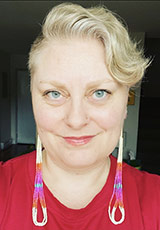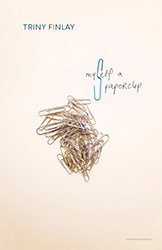Triny Finlay

Teaching Professor (On sabbatical leave until Jan. 1, 2026)
Carleton Hall 229
Fredericton
Triny Finlay (she/they) is a settler poet, writer, teacher, and scholar (of Irish, Scottish, and Scandinavian descent) living and working on the unsurrendered and unceded lands of Wolastoqiyik.
Triny’s creative work intersects with their research and teaching interests, which include creative writing, Canadian literatures post-WWII, poetics, the long poem, theories of genre and form, and gender and sexuality in literature.
Research and creative projects

Triny’s serial long poem, Myself A Paperclip (icehouse/Goose Lane 2021), explores their experiences with mental illnesses, their treatments and stigma. Myself A Paperclip won the 2022 Fiddlehead Poetry Prize (New Brunswick Book Awards) and was shortlisted for the 2022 JM Abraham Poetry Award (Atlantic Book Awards).
Triny is also the author of the critically-acclaimed books Histories Haunt Us (Nightwood 2010) and Splitting Off (Nightwood 2004), along with the chapbooks Anxious Attachment Style (Anstruther 2022), You don’t want what I’ve got (Junction 2018) and Phobic (Gaspereau 2006). Their chapbook Finding the Love You Need will appear in Fall 2025.
Triny’s writing has appeared in anthologies and periodicals such as The Ampersand Review, Arc Poetry Magazine, Best Canadian Poetry 2023, Breathing Fire 2: Canada’s New Poets, Contemporary Verse 2, The Fiddlehead, The Globe & Mail, Grain, The London Reader (UK), The Malahat Review, Marsh Blue Violet: A Queer New Brunswick Anthology, Plenitude, The Temz Review, THIS Magazine, University of Toronto Quarterly and Untethered.
Triny’s current research investigates the relationships among documentary poetics and the elegiac mode in contemporary Canadian poetries, using book-length long poems by authors such as Anne Carson, George Elliott Clarke, Phinder Dulai, Louise Halfe –Sky Dancer, and Soraya Peerbaye as case studies.
Teaching
Triny approaches teaching from a feminist, anti-racist, and decolonial perspective, with a strong focus on issues of anti-oppression, often informed by their own positionality as a queer and genderfluid feminist who lives with chronic mental illness. In recent years, they have taught the following courses, troubling conventional conceptions of the English literary canon and challenging colonial, racist, and cis-heteronormative narratives:
- ENGL 1000: Introduction to Modern Literature in English
- ENGL 2195: Introduction to Creative Writing: Poetry and Drama
- ENGL 2603: Literature of Atlantic Canada
- ENGL 2608: Introduction to Contemporary Canadian Literature
- ENGL 2987: Introduction to Queer Literatures
- ENGL 3123: Creative Writing: Poetry
- ENGL 3698: Canadian Literature Since 1970
- ENGL 3883: Women’s Writing in English
- ENGL 5184: Identity in Atlantic-Canadian Literature - Honours Seminar
- ENGL 5188: Innovative Poetics in English Canada Since 1945 - Honours Seminar
- ENGL 5189: The Contemporary Canadian Long Poem - Honours Seminar
- ENGL 5623: Re-Conceiving the Long Poem - Honours Seminar
- ENGL 6105: Directed Reading: Critical Race Theory and BIPOC Poets - Graduate Seminar
- ENGL 6123/43: Creative Writing: Poetry - Graduate Seminar
- ENGL 6623: Innovative Poetics in Canada - Graduate Seminar
- ENGL 6626: The Contemporary Canadian Long Poem - Graduate Seminar
- ENGL 6689: Writing As Resistance: Canadian Literatures and the Politics of Anti-Oppression - Graduate Seminar
Graduate supervision
Triny has supervised graduate projects in poetry, creative non-fiction, autotheory, and fiction, covering a wide range of fields and ideas, such as: queer and feminist poetics of ecological and personal trauma; the effects of immigration and dislocation on women’s and children’s lives; the intergenerational impact of exile and genocide; women’s lived experiences of chronic illness; feminist poetics of food, trauma, and the body; ekphrastic poetries of place; representations of bisexuality; the relationship between queerness and faith; queering food culture through transgender experience; representations of mental illness in outsider art; and queer liberation through transgender joy.
Current member of the Graduate Academic Unit.
Recent supervisions (completed)
PhD:
- William Bonfiglio, PhD (CW: Poetry): “Brut Elegies” (Co-Supervisor with Dr. Sue Sinclair)
- Rebecca Salazar, PhD (CW: Poetry and Non-Fiction): “ANTIBODY // Traumatic Entanglement, Eco-Poethics, and Speculative Horror as Survivor Futurisms” (Co-Supervisor with Dr. Randall Martin)
*winner of the Governor General’s Gold Medal for Best Dissertation*
MA:
- Kath Gerobin, MA (CW: Autotheory/Poetry): Haunting Home: The Uncanny as Theory and Praxis in Autotheoretical Writing (Supervisor)
- Drew Ng, MA (CW: Poetry): “She Once Told Me the Secret of the Stars” (Supervisor)
- Rosie Leggott, MA (CW: Playwriting and Poetry): “The Lock: A Play About Wrongful Convictions” (Co-Supervisor with Dr. Len Falkenstein)
- Shauna Deathe, MA (CW: Poetry): “Pyrophyte: A Field Guide to Burning Alive” (Supervisor)
- Grace Taylor, MA (CW: Poetry): “Wolf Peach” (Supervisor)
- Melissa Spohr, MA (CW: Poetry): “A Pickled Egg for Adam” (Supervisor)
- Ben Dawson, MA (CW: Poetry): “Breaking Things Apart and Putting Them Back Together” (Supervisor)
- Izza Hassan, MA (CW: Creative Non-Fiction): “Ammi” (Supervisor)
- Claire Hoffman, MA (CW: Fiction): “Both/And” (Supervisor)
- Grace Annear, MA (CW: Fiction): “Chronic” (Co-supervisor with Prof. Mark Jarman)
Service
Triny serves on a variety of departmental, faculty and university committees.
